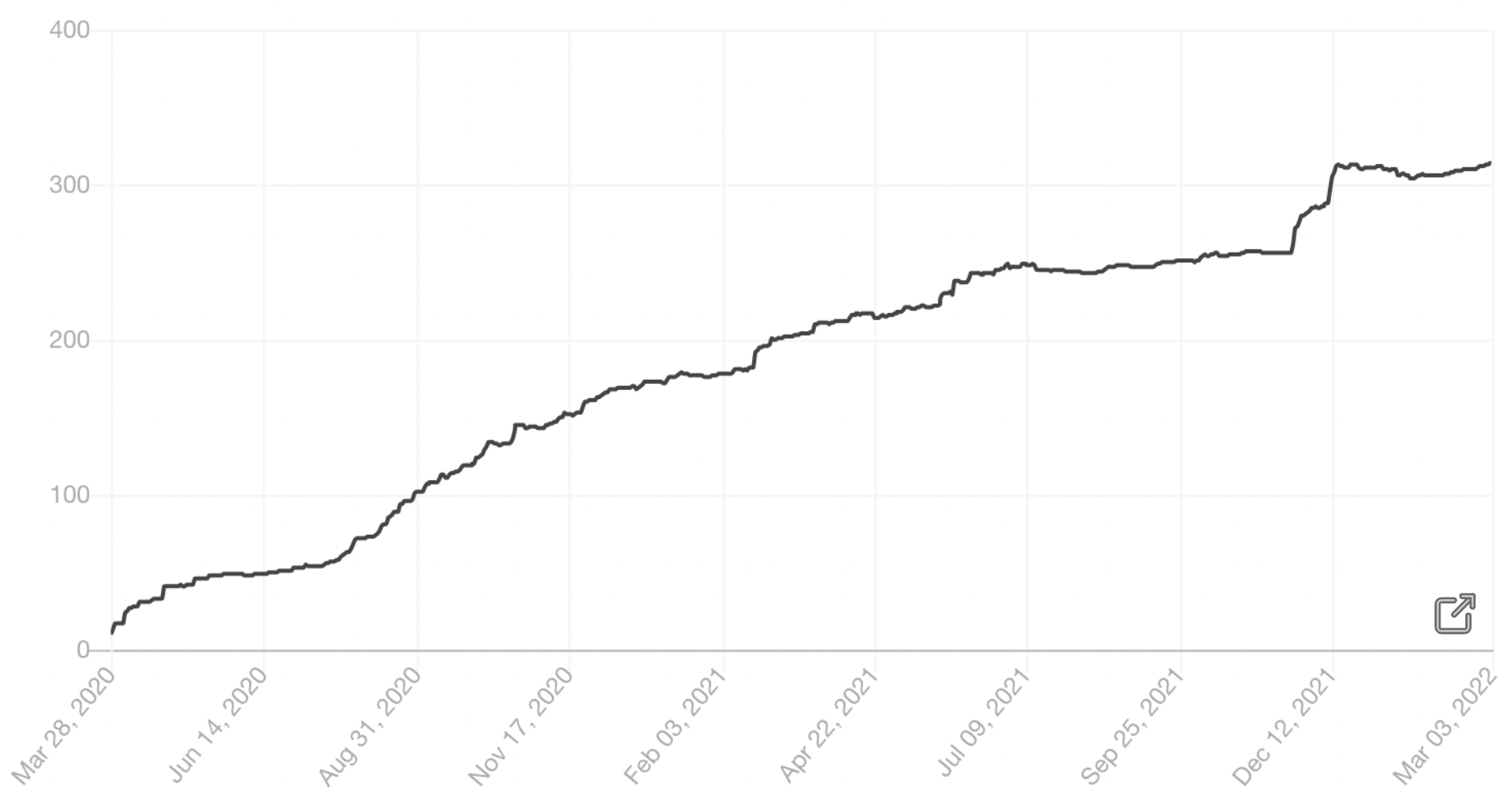Let’s flashback to March 29, 2020.
That was the first day that I wrote a newsletter: Letter #1 from a Learn-it-all.
It was about two weeks into lockdown. Toilet paper was a hot commodity in Chicago. I was worried about running out of groceries in the city, so I drove home to Michigan to be with my family. I’d finished up my second time in a course for an online writing school.
Sending out a newsletter was a homework assignment I failed to do the first time. I am currently taking Write of Passage for the sixth time since November 2019, and I’m honored to be able to support in teaching it for the third time. There’s no other course I have taken twice.
I’m not in this for audience growth. I’m in this for so many other reasons. Each letter affords me the opportunity to observe my personal growth and harness self-knowledge. I get to tap into my past to savor for my future self and posterity.
The more I write, the more I think and the more plentiful ideas flow out of me. I now believe that I already possess everything I need to write. The first two decades of my life, I was sitting in a classroom during the working hours of the day. I’ve been consuming for much of my life, like many others.
Writing online has changed my life in countless ways. Fifteen lessons that I have learned from these past 100 weeks are:
1.Begin writing for yourself. If I do it for anyone else, it can immediately fall to the wayside as I never have full control over anyone but myself. Writing for myself allows me to crystallize my ideas. I would not be the writer I am today without the daily journaling practice that I have for myself. Some of the various reasons of why I write include:
-
To feel cathartic with releasing the ideas from my working memory to later reinforce
-
To be a better storyteller as I intentionally live my life
-
To stay in touch with my relationships while I am more isolated on the most remote chain of islands in the world
-
To leave bread crumbs for my future self to see the progression of my growth
-
To remember better and find silence to reflect for ideas to surface
-
To create space between feelings and problems living in my head so I begin to solve them
2. View sharing your love for an idea as an obligation. When I feel obliged to share because it helped, I am more likely to share. I am not forcing anyone to read my work. It is their choice to read it. Just because something has been shared does not mean that it has been heard. I have ammunition against all the blockers that I have if my love for an idea is great enough.
As prolific writer Seth Godin shares, “Understand that a non-fiction book [or blog post] is a souvenir, just a vessel for the ideas themselves. You don’t want the ideas to get stuck in the book… you want them to spread. Which means that you shouldn’t hoard the idea! The more you give away, the better you will do.”
3. Project manage your passion for writing. Otherwise, it’ll never get done. What does this mean? Set a deadline.
I’m a recovering perfectionist. When I love and care about something, I don’t want to rush it. I worry it’ll be flawed so it won’t accurately mirror the abstract thoughts in my head. But it’s too good to keep to myself, so I really must share it in some form, even if it is imperfect. It’s my obligation to share my love of an idea no matter how flawed. I can always revisit any piece of work eventually. In the long run, moving on will give it more color.
We are human, so flaws are to be expected. Perfection doesn’t exist. I choose progress instead. That’s more feasible and human after all. Have a force to function. It pushes me to be brave, pushing the publish button to ship when I have a deadline.
4. Use the scary publishing button to your advantage. It helps as mechanism to distill and remove fluff. I can’t help but want to save reading time. The publish button helps me to kill my darlings.
5. Keep posterity in mind. The Internet isn’t going anywhere. Take a glance at the whole phenomenon of the Internet having its own cryptocurrency. I made this website after my Dziadzia passed for a project to write about how I looked up to him. His stories are now captured so anyone down the road as the family tree grows can be reminded of who he was.
6. Use templates as a first draft. There’s no need to recreate the wheel each time. I iterate as I go, but never start from a blank mind. Having a template is like setting the table for dinner and getting to decide what goes on the plate.
7. Fill the beginning with questions. These light up the path I want to walk. It’s like having a miracle memory while packing to bring a flashlight for camping. Sure, I could stumble around the woods to the loo after my eyes dilated, but I might trip on a tree root if there’s no moonlight.
Questions keep me moving instead of falling over. They create momentum. Starting simply with “what did I consume and why?” Is a great starting place.
8. Curate with commentary in mind. What’s surfaced on the Internet could be golden, but also remember how important commentary is.
Save the readers time by sharing what you specifically think about that link and why it matters. What’s the “So what?” Our curiosities are like rolling stones but make them gather moss by digesting ideas longer. We can make them more memorable by linking the thought to our own unique experiences.
9. Live life like a search engine and serendipity will strike. Don’t panic if you feel uninspired. For Pete’s sake, I wrote a letter to boredom because I was bored at the mere thought of publishing something on Day 21 of my 100 daily Ship It project.
I’ve had faith in my ability to hone my attention and focus intentionally on what I’m trying to solve. In the past months, this has happened while ‘procrastinating writing’ through reading a poetry book on a plane, in a conversation with a friend at volleyball, responding to an email, and by engaging on my Twitter feed. If you have only one idea or piece of content to reference, that can be just enough to spark my curiosity to start rolling the snowball down the hill. More isn’t necessarily better.
10. Ask yourself prompts before you’re ready to answer them. It narrows my attention in my brain on content that will make me wiser eventually to answer it. I thank my intuition for that. I choose not to stress today, and rather adopt a growth mindset that “I don’t know yet”. This has compiled to a seemingly never- ending list of questions to myself that I want to someday be able to answer. I chip away at it each week and that is all I can do. My brain will start to answer them over time. I have hope. That’s what Richard Feynman did with his 12 favorite problems.
11. Write about what’s obvious and simple to you. Similar to shy Shrek, I can peel back the onion layers after. In other words, I can mine for the gold and level up the deeper I go. It’s up to me to find those sparkly jewels worth showing off. I don’t need a complex note-taking system. It can turn into a place where ideas go to die. They easily get forgotten.
Leonardo Da Vinci said, “Simplicity is the ultimate sophistication.” All it takes is one simple epiphany worth sharing. And another one for later. Creativity makes more creativity.
We already know enough as we are. We just need to pay attention. This means being receptive to others as we interact in life. but also to ourselves and what brings us joy and energy.
12. Shoot for good enough and grant yourself forgiveness. If I wasn’t completely satisfied with what I shared, I know that next week I can redeem myself. I’m only human after all.
Confession time: I don’t think I have ever sent out a letter without a typo. I attribute much of this to my slow typing speed, which I’ve recently become embarrassed about. A new habit I formed since March is using Typing Pal’s exercises.
13. Create connections online. There’s no denying that anyone who has a smart phone and internet connection will inevitably be online. Use that convenience to move relationships to become closer more quickly. This happens when others read what you write. It is a great way to jumpstart a connection and help guide others to what you are curious about. Assume who you are writing for your best friend who wants the best for you.
14. Google yourself when your working memory is faulty. It’s beautiful to use the Internet as a tool to serve yourself. My newsletter serves similar to a facebook memory acting as a time capsule into what I was thinking that week. If I’m ever asked a question that I know I can answer more directly from sharing my blog, I send that directly to that person to be able to follow up beyond that conversation and keep it going offline as well.
15. Have fun and try out new things. Even if something seems silly, it can act as an experiment to try something new. Some of these for me were trusting that SubStack would actually send out my letter at the scheduled time, adding audio Racket recordings, and having my monthly reviews be more public.
Writing helps me make sense of life. I don’t know how I would solve problems without writing. It helps me crystallize thoughts. I have immense gratitude for the symbols of the alphabet and language as a foundation for connection. I’d be a much more lonely, intellectually deprived and less self-aware 26 year old without my weekly practice of writing online.
If you have never written online and feel overwhelmed, try sharing something with one person and see how that goes. Just start writing about an idea or what is going on in your life. Next time try sharing it with two people. Writing can change your life.



